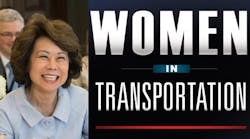In many ways, Secretary Chao’s family history is not only a quintessentially American story but is one also tied closely to the transportation industry itself.
Her father, Dr. James S. C. Chao, was born in a small farming village outside Shanghai, China, and worked hard to pursue his dream of becoming a sailor. In 1949, in the middle of the Chinese Civil War, he boarded a ship for a seagoing apprenticeship—a short voyage that represented the last requirement for him to become a full-fledged sailor.
But in a way, that voyage never ended.
Shortly after Dr. Chao sailed away from Shanghai, the Communists came to power and closed the port. He never saw his family again.
“This separation has always been a source of sadness for my father and our family,” Secretary Chao recalled recently. “Yet this setback did not deter my father from pursuing his dreams, because his family had provided him with a strong foundation and clear principles.”
Dr. Chao later became a ship’s captain at age 29—an unusual achievement in those times—and then immigrated to America with a young family in tow. Secretary Chao was just eight years old at the time and unable to speak a word of English.
Secretary Chao went on to speak English fluently, however, obtaining U.S. citizenship at the age of 19 before going on to earn a degree in economics from Mount Holyoke College and eventually a master’s degree in business administration from Harvard Business School.
It’s perhaps fitting that among the many executive positions Chao has held during her long career—which included stints as the director of the Peace Corps, where she established the first programs in the Baltic nations and the newly independent states of the former Soviet Union, and CEO of the United Way of America charity—she started out in transportation.
Early in Chao’s career, she specialized in transportation financing in the private sector. Her first foray into public service started with work on transportation and trade issues at the White House under President George H. W. Bush. She then became deputy maritime administrator and chairman of the Federal Maritime Commission before moving up to become Deputy Secretary of the U.S. Dept. of Transportation.
Chao served as Secretary of Labor during President George W. Bush’s two terms—the only cabinet member to do so and the longest-serving Secretary of Labor since Frances Perkins, who served from 1933 to 1945 under President Franklin D. Roosevelt. After serving as a distinguished fellow at the Hudson Institute, Chao became one of the first cabinet appointees of President Donald J. Trump’s administration, becoming Secretary of Transportation on January 31 this year.
One of the biggest challenges she sees ahead for the transportation industry as a whole and the people who rely upon it is how fast the pace of change is becoming.
“Technology, the great disruptor, is creating a new type of transport based on digital, not human, command and control,” Chao pointed out. “In the future, computers, not people, will be in the driver’s seat. That means ‘self-driving’ cars, trucks, railroad cars, ships, and drones. This technology has the potential to change our lives in ways we can’t imagine.”
And that’s why Chao believes that strong leadership will be needed to guide such change. She emphasized that women continue to play a key and growing role in transportation, noting that women-owned businesses won more than 9% of DOT direct procurement contracts in fiscal year 2015, along with 64% of “indirect contracts” with the Federal Aviation Administration, Federal Highway Administration, and the Federal Transit Administration—contracts totaling more than $2.4 billion.
“These are just a few examples of women achieving success in the transportation sector,” she said. “So although there is still more to do, we’ve come a long way.”
And she stressed that there isn’t a better time for women to pursue a career in transportation than right now.
“Let me share one more thought. I come from a family of six daughters. My parents were incredible people who believed that their daughters could do anything they wanted in this wonderful country which offered so much opportunity,” Chao said. “They taught us to set goals, to proceed step by step to advance and improve our situation. And they taught by their own example to always help others along the way. I hope we will remember to reach out and help others who are coming along.”



